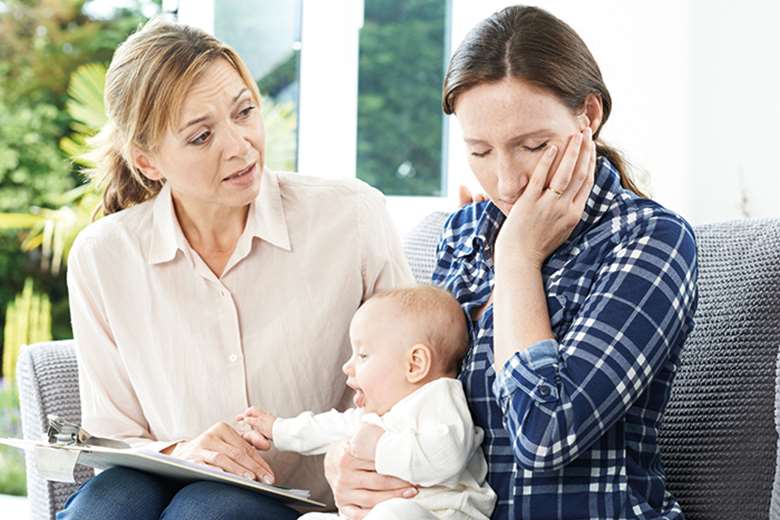Tackling parental alcohol risk
Derren Hayes
Tuesday, November 27, 2018
Health visitors are vital for engaging parents about alcohol use and the risks to children, says expert.

A recent court case over the death of a seven-week-old baby whose mother fell asleep holding her after consuming half a bottle of vodka highlights the risks of parental alcohol misuse to young children.
The case comes after the Office for National Statistics reported that the unexplained infant mortality rate increased from 195 deaths in 2015 to 219 in 2016.
Meanwhile, recent analysis by the University of Warwick of 27 serious case reviews involving sudden unexplained infant deaths found that if parents followed UK safe sleep guidance, many of those infant deaths could have been avoided.
"Falling asleep with a baby in a bed, chair or sofa after drinking alcohol increases the risk of sudden unexpected death in infancy (SUDI)," says Dr Jo Lacey, an expert in this field and fellow of the Institutes of Health Visiting.
Lacey says health visitors and midwives are well placed to offer alcohol advice, support and referral to those who drink alcohol to a harmful extent, and should ask parents about their use routinely.
"Holding alcohol-specific knowledge, skills, confidence and competence, and having a positive attitude towards raising the issue of alcohol use, has been shown to play a key part in breaking down barriers," she says.
"Reducing professional anxiety around raising the issue of alcohol use, combined with challenging negative attitudes, has been shown to improve the quality of support provided and to promote positive outcomes for children and families."
However, the threat posed to children by alcohol misuse goes beyond SUDI, explains Lacey - it increases the risk of abuse and neglect, domestic violence and abnormal child development.
Heavy drinking is also a common factor in relationship breakdowns and parental mental health problems.
The government is to invest £6m over the next three years to improve the lives of an estimated 200,000 children in England who live with alcoholic parents.
Lacey believes alcohol awareness should be incorporated into health visitors' core practice, and outlines below how practitioners can adopt an approach that supports parents and reduces the risk to children.
EXPERT VIEW
What is an alcohol brief intervention and how can health visitors use it?
By Dr Jo Lacey, quality improvement mentor and serious incident investigator, North East London NHS Foundation Trust
An alcohol brief intervention is a treatment model designed to reduce alcohol use in the early stages by encouraging behaviour change by motivating and supporting an individual to achieve moderate, non-hazardous levels of alcohol use rather than complete abstinence.
Alcohol brief interventions should be short, evidence-based, structured and non-confrontational, and aim to motivate and support parents to think about risk of harm and to plan behaviour change.
Non-alcohol specialists such as health visitors and midwives can deliver an alcohol brief intervention with appropriate training, and a number of tools are available to help with this.
The aim is to increase understanding of the risks associated with alcohol use by highlighting the importance of reducing their consumption and by recommending strategies to promote a change in their hazardous behaviours.
An individual's level of motivation has an impact on their decision-making and their readiness to change.
Health visitors, midwives and others working in public health may positively influence an individual's readiness to change by increasing motivation and reducing resistance.
An alcohol brief intervention should include a minimum of half a day's training in alcohol awareness. To improve brief intervention effectiveness and to enhance clinical decision-making, beliefs and attitudes relating to alcohol should be explored during training.
A training programme should include:
- Case vignettes for group discussion
- Understanding why people drink
- Definitions of the terms hazardous, harmful and dependent drinking
- What constitutes an alcohol brief intervention
- The health harm(s) and signs and symptoms of alcohol misuse
- How to raise the issue of alcohol use
- Impact on and harm to the family
- Support for staff (those delivering the intervention)
- The cycle of change
- Signposting and referral criteria/ pathways
- A short annual update e-learning package should be explored to support and complement face-to-face sessions and to achieve flexibility and cost-effectiveness
- An understanding of motivational interviewing, with this being incorporated into any extended brief intervention training programme.
The FRAMES model explains more about the delivery of an alcohol brief intervention. This includes:
- Feedback: about a personal risk or impairment
- Responsibility: for change
- Advice (with permission): to cut down or abstain
- Menu: of options for changing drinking behaviours and target-setting to reduce alcohol consumption
- Empathic interviewing: listening reflectively without trying to persuade or confront
- Self-efficacy: an interviewing style that enhances an individual's belief in their ability to change.
FURTHER READING
- All Our Health guidance, Public Health England, February 2018
- Free online training from NHS Health Education England
- Have a Word Scratchcard, Public Health England, February 2018




